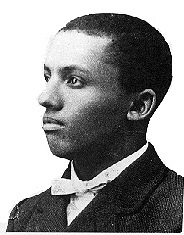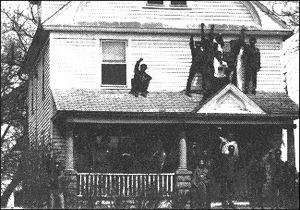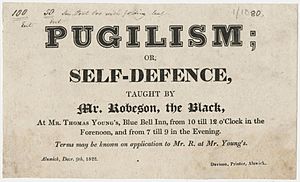Black History Month facts for kids
Quick facts for kids Black History Month |
|
|---|---|
| Also called | African-American History Month |
| Observed by | United States, Canada, United Kingdom, Netherlands |
| Significance | Celebration of the African diaspora including, African-American history |
| Date |
|
| Frequency | Annual |
Black History Month is a special time each year to celebrate the history and achievements of Black people. It started in the United States and is also called African-American History Month there.
This important month is officially recognized by governments in the United States and Canada. More recently, countries like Ireland, the Netherlands, and the United Kingdom have also started observing it. It's a way to remember the amazing people and events in the history of Black communities around the world.
In the United States and Canada, Black History Month is celebrated in February. In Ireland, the Netherlands, and the United Kingdom, it is observed in October.
Contents
How Black History Month Started
Negro History Week: The Beginning (1926)

The idea for Black History Month began in 1926 in the United States. A historian named Carter G. Woodson and his group, the Association for the Study of African American Life and History, created "Negro History Week."
They chose the second week of February for this celebration. This week was special because it included the birthdays of two important figures: Abraham Lincoln (February 12) and Frederick Douglass (February 20). Black communities had already been celebrating these dates for many years.
Woodson believed that at least one week dedicated to Black history would help it become an annual event. He also felt that after working hard on his "Journal of Negro History", the topic needed to reach more people.
From the very start, the main goal was to encourage schools to teach the history of Black Americans. Woodson felt that learning Black history was vital for Black people to thrive in society. Churches also helped share information about Negro History Week. Newspapers, both mainstream and Black-owned, helped spread the word too.
Over the years, Negro History Week became more and more popular. Mayors across the United States began to support it as a holiday.
Black History Month in the United States (1970)

The idea for Black History Month itself was first suggested by Black educators and the Black United Students group at Kent State University. This happened in February 1969.
The very first Black History Month celebration took place at Kent State University from January 2 to February 28, 1970.
Six years later, Black History Month was celebrated all over the country. Schools, Black cultural centers, and community centers joined in. In 1976, President Gerald Ford officially recognized Black History Month. He encouraged Americans to "honor the too-often neglected accomplishments of Black Americans."
The Black community welcomed Black History Month with great excitement. It led to the creation of Black history clubs and increased interest among teachers. Many progressive white people also showed interest.
On February 21, 2016, a 106-year-old school volunteer named Virginia McLaurin visited the White House. She was there as part of Black History Month. When asked why she was there, McLaurin said, "A Black president. A Black wife. And I’m here to celebrate Black history. That's what I'm here for."
Black History Month in the United Kingdom (1987)
In the United Kingdom, Black History Month was first celebrated in October 1987. This year was also special because it marked 150 years since the end of slavery in the Caribbean. It was also 100 years since the birth of Marcus Garvey and 25 years since the Organization of African Unity was formed.
A Ghanaian analyst named Akyaaba Addai-Sebo helped organize Black History Month in the UK. He worked with the Greater London Council (GLC) to make it happen. The first celebration was in London in 1987. Dr. Maulana Karenga from the US was invited to an event to honor the contributions of Black people throughout history. Addai-Sebo created a plan to recognize the contributions of African, Asian, and Caribbean people to life in the UK. Other areas in the UK soon began to celebrate October as Black History Month too.
Black History Month in Canada (1995)
In 1995, a politician named Jean Augustine from Ontario suggested a motion. Canada's House of Commons then officially recognized February as Black History Month. They also honored Black Canadians.
Later, in 2008, Senator Donald Oliver asked the Senate to officially recognize Black History Month. This was approved by everyone.
Black History Month in the Republic of Ireland (2010)
Black History Month Ireland started in Cork in 2010. This city was a very fitting place for it to begin. In the 1800s, Cork was a major center for the movement to end slavery. Anti-slavery groups there welcomed many Black abolitionists to speak, including Charles Lenox Remond and Frederick Douglass.
Modern Celebrations
Black History Month has grown a lot over the years. In 2018, Instagram launched its first Black History Month program. This was done with the help of Shavone Charles, who worked on global music and youth culture communications.
By 2020, Black History Month was not just focused on schools. The Wall Street Journal described it as a time when "the culture and contributions of African Americans take center stage." Many cultural places like theaters, libraries, and museums now participate.
Businesses in the U.S. have also started to pay attention. In February 2020, Forbes noted that "much of corporate America is commemorating" Black History Month. This included companies like The Coca-Cola Company, Google, Target Corporation, Macy's, United Parcel Service, and Under Armour.
Themes for Black History Month
In the United States, the ASALH chooses a special theme for each Black History Month. These themes help focus on different important parts of Black history and culture every year. For example, some past themes have focused on Black women, civil rights, or the arts.
See also
 In Spanish: Mes de la Historia Negra para niños
In Spanish: Mes de la Historia Negra para niños
- List of African-American women in STEM fields
- Lists of African Americans
- List of African-American astronauts
- List of African-American ballerinas
- List of African-American sports firsts
- List of African-American activists
- List of black Nobel laureates
- List of African-American inventors and scientists
- List of African-American mathematicians
- List of African-American women in medicine
- African-American women in computer science
- African American history
- The Journal of African American History
- African-American Heritage Sites
- Civil rights movement (1896–1954)
- Civil Rights Movement
- List of civil rights leaders
- Timeline of the civil rights movement
- Timeline of African-American history
 | Tommie Smith |
 | Simone Manuel |
 | Shani Davis |
 | Simone Biles |
 | Alice Coachman |


